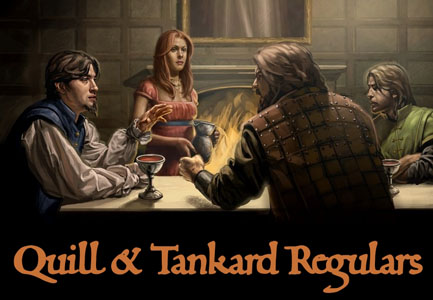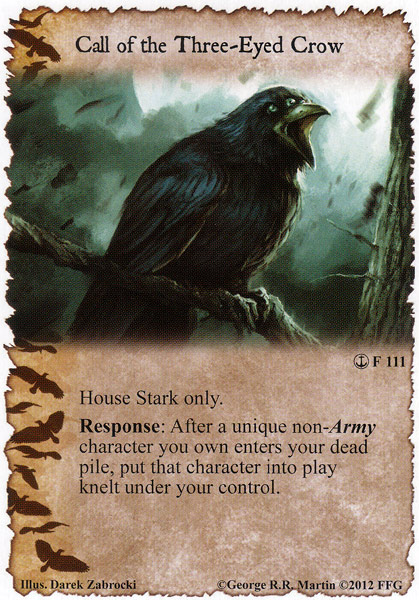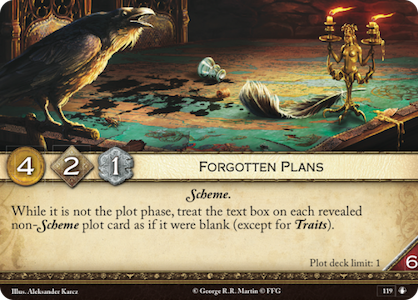Welcome to Card Game DB
Register now to gain access to all of our features. Once registered and logged in, you will be able to create topics, post replies to existing threads, give reputation to your fellow members, get your own private messenger, post status updates, manage your profile and so much more. If you already have an account, login here - otherwise create an account for free today!
Register now to gain access to all of our features. Once registered and logged in, you will be able to create topics, post replies to existing threads, give reputation to your fellow members, get your own private messenger, post status updates, manage your profile and so much more. If you already have an account, login here - otherwise create an account for free today!
Quill & Tankard Regulars - Vol II, Issue 10
May 01 2016 04:05 AM |
WWDrakey
in Game of Thrones
WWDrakey Istaril JCWamma Ratatoskr Ire Quill & Tankard Regulars - Volume 2, Issue 10
Quill & Tankard Regulars - Volume 2, Issue 10Not that bloody bird again! And here I was winning this time, for sure!
Ha! As IF. My dornish spearwomen were ambushing you on the plain. I was just letting you wander about getting addled by the heat first!
Highgarden Knights do NOT get addled! Tipsy, perhaps. Or somewhat pickled.
Buggrit! Lez git ars’ fees’d!
Aye, I guess that’s the only logical solution we have left then. Lager or sahti?
Caw! Caw! Caw!
Sahti it is, then.
Scribe's Heart - Formal Language Constructs
Scribe's Heart is a series of articles delving deeper into specific topics, from game mechanics to specific types of card effects and beyond. An effort is made to explore the discussed topics in-depth, in order for these articles to function as important study material for both apprentice and acolyte.
Rules text in card games is an interesting topic, as it’s an area where games try to strike a precarious balance between easy readability and exact definition of how a card interacts with the game mechanics. Most FFG LCGs have slowly shifted to a very similarly templated approach - ostensibly to ease cross-game movement of both players and designers. AGoT utilizes a formatting where only a partial timing limitation (phase), ability class (Action, Interrupt, Reaction) and the split between game & player initiated effects (Forced) is indicated through a strictly templated approach, and the rest of the rules specifics are embedded into the ability text. Notable elements left outside of the strict templating in AGoT (but strictly templated in other games) include at least the indication of costs & specific play requirements.
This means that a card’s effect text ends up being a mixture of plain readable english, and special terms with very specific rules implications. In essence, card text is a mixture of natural language and a formal language. Now, to avoid the text feeling awkward for the reader, those specific formal language constructs in AGoT are in fact done using everyday household vocabulary (like ‘to’ or ‘then’).
So… why did we just waste your time teaching you about the way AGoT card effects are formed? Why, because this is Q&TR, of course. And partially, because a lot of the way cards are often initially misunderstood is caused by people not being aware of the formal language vocabulary embedded into the text. Players will interpret a seemingly innocent word like “toâ€, and working from a natural language basis, will not understand its specific exact meaning within the AGoT formal language, often leading to missing key limitations or implications. And it’s not just the players… developers too have managed to shoot themselves in the foot without adequate understanding of those formal language rules. Just ask any 1.0 rules-savvy players about Call of the Three-eyed Crow. If only it had said "instead", instead of what it said.

Now, the reason we’re talking about those formal language elements within AGoT card text, is none other than to go through key terms of the formal vocabulary listed in the RRG, concentrating on words often found in everyday natural language. Why? Because, if you give a player a ruling by interpreting the formal language, that only helps them play that single card correctly (and makes them feel somewhat fishy about why something acts the way it does, on the side). However, if you teach that player to interpret it themselves… why, they’ll be set for a long time. But not in the formal meaning of “setâ€, of course. Only the natural language one!
“Againstâ€:
Spoiler
Flip open your Rules Reference, and in the first 2 pages you’ll find the game defining “Againstâ€. This is the perfect example of an english language term that seems obvious and clear, until the question “does Danaerys Targaryen’s STR reduction apply when someone is attacking me?†(yes!) shows up, and you realize that ‘against’ isn’t as unambiguous as you thought - in English, it can be taken to mean aggression upon or opposition to. The rules set us straight, and define the term formally for us.
“Cannotâ€:
Spoiler
This should be clear enough. Not only is cannot preventing something from happening, but also whenever two card effects are in conflict, the card with “cannot†on it takes precedence.
“Chooseâ€:
Spoiler
A good example of a term, where the natural language interpretation of the word is not quite as strict as it’s formal language one. Essentially, “choose†is used in AGoT to hide mandatory targeting requirements within the card text. For a card where this matters quite a bit, one need only look at Even Handed Justice, and the subsequent inability to play the event unless all players have valid targets.
“Immuneâ€:
Spoiler
Immunity is a difficult concept often in AGoT, as it’s details don’t quite match up with those from other card games. An especially curious part here is the fact that gained immunity will not affect lasting effects already in place.
“Insteadâ€:
Spoiler
In second edition, through careful wording choices, replacement effects tend to be much more straightforward entities than they were in first edition. Regardless, it’s still a good idea to learn to spot the formal term “instead†within card text, as replacement effects can do some surprising things.
As an example, what the event Trial By Combat does, is temporarily change what intrigue claim means. This change has some interesting repercussions, like Immune to Events characters not being safe from Trial By Combat. Similar issues arise with multiple replacement effects on the same triggering condition, such as with Vengeance for Elia & Seastone Chair.
“Printedâ€:
Spoiler
Essentially, “look at the ink on the card & nothing elseâ€. We’ve already seen this word do some very interesting things with Weapons at the Door.
“Setâ€:
Spoiler
From a natural language point of view, setting a value overriding future modifiers to raise / lower it is clearly not expected. Relevant yet in 2nd Edition? Not quite, but all it takes is one card that sets a claim value… and we had several of those in first edition.
“Thenâ€:
Spoiler
So, essentially the formal language term “then†has been encoded with the classic “if X, then do Y†conditional statement. Very different from the natural language usage of the word “thenâ€, which mainly just relates to indicating the order in which two things happen.
“Toâ€:
Spoiler
That’s… a lot of rules meaning to be placed on a single, quite common, word. Not only does “to†define what is a cost and what is an effect, but it places implicit restrictions on the text around through that distinction.
No wonder the word “to†has been the classic tripping point for people trying to understand 2nd Edition card texts. There have already been misunderstandings with cards like Tithe & Wardens of the North, and we can likely expect more to arise through the whole lifespan of the game.
“Wouldâ€:
Spoiler
Again, a very innocent looking word, with a surprising formal meaning. In effect, “would†is used for cancel / save interrupts (do a quick search with the CGDB deckbuilder for cards with the text “wouldâ€, and you’ll find all save / cancel cards, and nothing else), to make sure that cancelling & saving are things that happen before any other Interrupts can take effect. Without it, we’d end up with weird situations of Joffrey Baratheon being able to claim power from his own death, then be saved from it.
The Raven’s Message
The Raven’s Message exclusively reveals and discusses an up-and-coming, either mechanically or rules-wise interesting, card. The cards are from future products, and have been obtained directly via raven from the Archmaesters at the (FFG) Citadel.
Here on the Northern hemisphere it’s been a somewhat chilly spring, and at times it’s almost seemed like we’re already seeing the First Snow of Winter everywhere. To that end, the card we’re previewing today seems somewhat pinpointed at trying to shake up how we approach the game once more.
That card would be a reincarnation of an old classic, Forgotten Plans:

Firstly, before even going deeper into what matters (the rule implications!) we should admire the art on Forgotten Plans. The scene depicted has clearly been taken from one of our late night strategy campaigns at the Quill & Tankard, with our signature Raven having taken a more… active role in the proceedings. Again. Bloody bird.
Now, onto what the card does. The first thing 1.0 veterans will notice, is that Forgotten Plans has lost it’s somewhat awkward “Treat all plots with name other than Forgotten Plans as if their text boxes were blank during every phase except the plot phase.†for a cleaner 2.0 “While it is not the plot phase, treat the text box on each revealed non-Scheme plot card as if it were blank (except for Traits).â€. Here, we nicely see the usage of plot traits allowing cleaner templating. Furthermore, like Nightmares and Milk of the Poppy, the blanking has been templated so as not to remove Traits, which might have been problematic in 2.0…
So, what tricky aspects of Forgotten Plans make this a good fit for the Regulars to preview? Well, a key point there would be plots with lasting effects, like Calm Over Westeros, and how they interact with Forgotten Plans. The answer here is simple: once a lasting effect from a plot has been created through its When Revealed:, the blanking of the card text does nothing. So, essentially Forgotten Plans has no effect on a Calm Over Westeros.
We’ve also got a somewhat entertaining interaction with constant plots like Blood of the Dragon, Fortified Position & Song of Summer, with the plots being active as a constant effect only in the plot phase they are revealed… and the next plot phase, just before new plots are revealed. That 1 STR weenie you marshaled against Blood of the Dragon will shuffle off this mortal coil come next plot phase.
The largest meta implications of the card should be obvious: We now have a counter-plot for plots like Rise of the Kraken, Wardens of the North, A Noble Cause, Ranger’s Cache, For the Watch, A Clash of Kings and especially the two new resets First Snow of Winter & Weapons at the Door. Of those, the First Snow of Winter interaction is likely the most important one, as Forgotten Plans should give more weenie-heavy decks like NW & Tyrell Crossing a method of teching against it. The fact that a lot of other popular plots are also somewhat affected should help Forgotten Plans find some leverage also against other decks, instead of being simply a pure First Snow of Winter silver-bullet.
In the game of plot anticipation & mind games, most cards should never be completely “safe†to reveal… however, at time of publication there is only a single and rarely seen plot in the cardpool that can provide that “Uh oh†moment… and that would be when revealing your Forgotten Plans against an opposing Marching Orders.
What did we forget in our planning for this issue? Let us know in the comments below!
Antti Korventausta (WWDrakey) is a self-proclaimed Finnish AGoT philosopher and doomsayer hermit, who used to practice Quantum Mechanics, but found that it paled to AGoT in both interest and complexity. Having played and judged for more years than he would like to admit, he has found himself on the winning side of rules arguments more than he would expect. In any game he plays, he has a tendency of playing anything he considers to be off the beaten path, whether it makes sense to others or not.
Helmut Hohberger (Ratatoskr) started playing AGoT in September 2010 and has never looked back (although his wife has, longingly). As a German, he loves rules - and I mean *loves* 'em. He is the quintessential rules board morlock. While the others played and frolicked about outside, he sat by candlelight in a remote corner of the library and tried to get a grasp on the intricacies of the 1st edition rules. He even thought he did not do too bad at it, but then the Call of the Three-Eyed Crow drove him into the darkest depths of madness and despair. But he’s all better now, honest, and looking forward to new challenges.
Iiro Jalonen (Ire) Started AGoT in 2009, got pulled under the waves by Krakens years ago, and has never looked back. While not an Oldtown local, he has often been spotted in the Quill & Tankard Inn making sure that the rules of sportsmanship are maintained with the traditional finger dance games. A self-inflicted Shagga and active member of the global AGoT community, he has always strived to know the rules of the game, in order to make them do ridiculous things.
James Waumsley (JCWamma) is a first edition veteran who has judged at multiple large tournaments including the European championship of Stahleck. A renowned loudmouth and pedant, he will shout about the rules loud enough that he can be heard by those north of the wall.
Alex Hynes (Istaril) co-hosts Beyond the Wall, writes articles for FFG, created and curates the Annals - and even tried to fill in ktom’s shoes in the big ktom drought of 2013. When the Regulars asked him to be an honorary member, he, of course, refused and said he didn’t have the time. Or should have, anyway. Still, how much work can being an “Honorary†member be?
- Amuk, drakk, theamazingmrg and 1 other like this



 Sign In
Sign In Create Account
Create Account











5 Comments
It's worth noting that, unlike its 1st edition version, it won't do anything against A Game of Thrones, Power Behind the Throne, Sneak Attack (though the 1st edition counterpart to this one, Focused Offence, specifically could not be blanked), The King's Peace, The Long Plan or Wardens of the West, since all of these plot have the Scheme trait.
Edit: Forgot about Scheme trait on SA...
I love how the traits continue to matter. Schemes are immune to this, but vulnerable to Naval Superiority. They can also be targeted by Pulling the Strings. We have Winter and Summer, are there any other plot traits that mattered yet?
Edicts and Kingdoms are vulnerable to Naval, not Schemes.